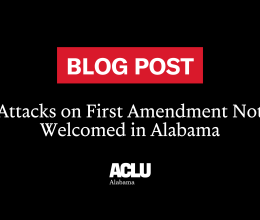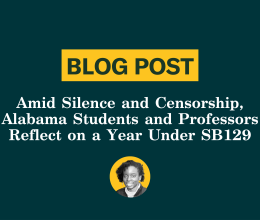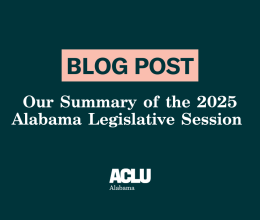
Update: On May 23, SB14 came to the House floor, where two amendments were offered and passed. However, because the House and Senate versions are different, the bill had to go back to the originating chamber to approve the new amendments. The Senate did not vote in favor of the House version, so on May 28, a conference committee was called, comprised of three members from the House and three members from the Senate. On May 30, the conference committee met and agreed upon a final version of the bill, which now goes to the Governor to sign.
Over the course of our 100-year history, the ACLU has fought to defend religious freedom. As enshrined in the First Amendment, religious freedom includes two complementary protections: the right to religious belief and expression and a guarantee that the government neither prefers religion over non-religion nor favors particular faiths over others. These dual protections work hand in hand, allowing people to practice their own religious beliefs while preventing religion and government from unduly influencing the other.
These protections do not change when someone enters a public school. Indeed, the Supreme Court has cautioned that we must be “particularly vigilant” in enforcing these protections in public schools because schoolchildren are impressionable and their attendance involuntary. The First Amendment guarantees students the right to pray, read religious literature, express their faith, and engage in other religious activities. It also ensures that students have the right to decide for themselves which faith, if any, to follow—without pressure or influence from their teachers or other school staff.
By allowing public schools to teach an elective Bible course, SB14 would undermine students’ First Amendment rights: These classes almost always turn into state-sanctioned Sunday school classes.
SB14 would authorize Alabama’s public schools to instruct students in the contents, history, and literary style and structure of the Bible. Specifically, it would allow middle schools and high schools to teach about “Bible characters, poetry, and narratives that are useful for understanding history and contemporary society and culture, including art, music, social mores, oration, and public policy” and “[t]he influence of the Bible on law, history, government, literature, art, music, customs, morals, values, and cultures.” Singling out one holy text for study in this manner is a recipe for constitutional infringement.
It is extremely difficult for public schools to teach a middle-school or high-school course focused solely on the Bible—or any one religious text—without violating the First Amendment. The subject matter can easily veer into promotion of religious doctrine; teachers typically lack the necessary training to delve into this sensitive subject; and schools generally do not impose any safeguards to protect students’ rights. For example, last year, an ACLU of Kentucky investigation found that Kentucky public schools with “Bible literacy” courses repeatedly proselytized students and flouted their constitutional obligation to present the subject matter in a secular, objective, and nondevotional way.
When state lawmakers pass measures like SB14, it’s students who pay the price. In public schools that take up lawmakers’ troubling invitation to improperly reject religion into academic curricula, students lose the right to make decisions about their faith and religious beliefs free from school interference. And those same students are deprived of educational resources as school districts are stuck with the cost of defending these constitutionally suspect courses in court and paying attorneys’ fees if they lose. In fact, a number of courts have found particular public-school Bible courses, as implemented, to be unconstitutional.
Religion is a deeply personal matter, best left to individuals, families, and faith communities to handle instead of public-school teachers. The Framers of our Constitution understood this and recognized that religion thrives best when government stays out of it. Alabama’s legislators should follow their lead.




